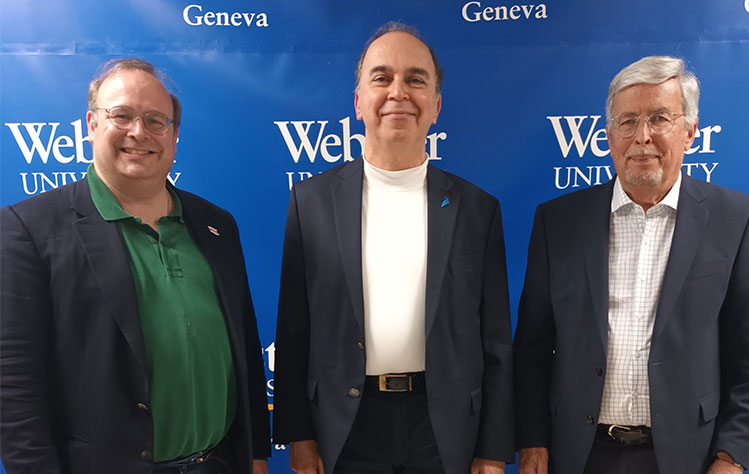Webster Geneva International Relations Program hosts “Russia and Ukraine: One Year On”
April 10, 2023

In February 2022, just two days prior to the Russian invasion of Ukraine, the International Relations Program at Webster University’s Geneva, Switzerland campus organized an event to provide perspective on the emerging conflict. Just over a year later, a similar event was held to take stock of what has transpired over the past twelve months, examine future implications, and analyze and educate around the ongoing crisis.
In his introductory remarks, event moderator and Webster Geneva Acting Director of International Relations Jubin Goodarzi stated that the invasion had come as a major surprise to most observers and analysts; one which has had devastating consequences that include the deaths of some eight thousand Ukrainian civilians and over 100 thousand soldiers on each side. He also noted that more than 14 million Ukrainians have been displaced within and outside their country, and that there are 18 million who need humanitarian assistance. Goodarzi welcomed three speaker-scholars for the event: Daniel Warner, Paul Vallet and Richard Sakwa.
Warner, an independent scholar who has previously held senior positions at the Graduate Institute of International and Development Studies and the Center for the Democratic Control of Armed Forces in Geneva, provided some historical background and context while questioning whether the war could have been avoided. He attributed blame, in part, to the triumphant attitude of the West during the aftermath of the fall of the Berlin Wall and the end of the Cold War. Warner underscored that Russia was treated with scorn and condescension and not taken seriously during the NATO-Russia dialogue that followed. He also pointed out that former Russian President Dmitri Medvedev’s proposal for a European Security Treaty in 2008 was dismissed by the West. Overall, Warner illustrated that these milestones and other initiatives, including the Corfu Process and the Minsk Process, represented missed opportunities that indicate the conflict with Russia was not inevitable.
Vallet, who is an associate fellow at the Geneva Center for Security Policy as well as an adjunct professor at Webster Geneva, shed light on European policy since the Russian invasion of Ukraine. He stated that Moscow’s actions were a humiliation of Europe; one that has signaled a significant change in European policy toward Russia. He highlighted that the European Union (EU) has adopted ten packages of sanctions against Russia over the past year and has provided some 50 billion Euros in aid to Ukraine. Furthermore, the EU has accepted over four million Ukrainian refugees and accelerated the process for consideration of Ukraine’s application for candidate status for EU membership. Vallet also explained that while the EU has been providing arms to Ukraine, it has been careful not to be dragged into a direct confrontation with Russia. He ended with a discussion of the EU’s decision to discontinue oil and gas imports from Russia last year, as well as the view that Europe was able to avoid energy shortages this past winter due to unusually mild weather and conservation efforts that were undertaken.
The event’s final speaker, Professor Sakwa, from the University of Kent in Canterbury, England, looked at the events leading up to the outbreak of the war in theoretical terms, focusing initially on the “Security Dilemma” that was introduced by John Herz. He posited that while NATO expansion may have been perceived by the West as a defensive action, Russia interpreted it as an offensive move that was a potential threat to its security. He also discussed the various positions of key realist thinkers in international relations such as John Mearsheimer, Hans Morgenthau and Reinhold Niebuhr. He compared the Russia-Ukraine war to a Greek tragedy and argued that the West should discard notions pertaining to the need to dominate Russia.
Sakwa further explained that the United Nations system is under strain and that the global world is witnessing the possible emergence of at least three major blocs in global politics: one led by the US, a liberal sub-order; a rival sub-order led by China and Russia; and a third alternative composed of non-aligned states in the Global South.
“Russia and Ukraine: One Year On” was organized with the support and assistance of Events Coordinator Dounia El-Jaouhari and International Relations Program Assistant Naraana Enkhjin.
The well-attended, in-person event was live-streamed and recorded via Zoom, where it can currently be watched for a limited time with the passcode: 5h5&@QL1BT
